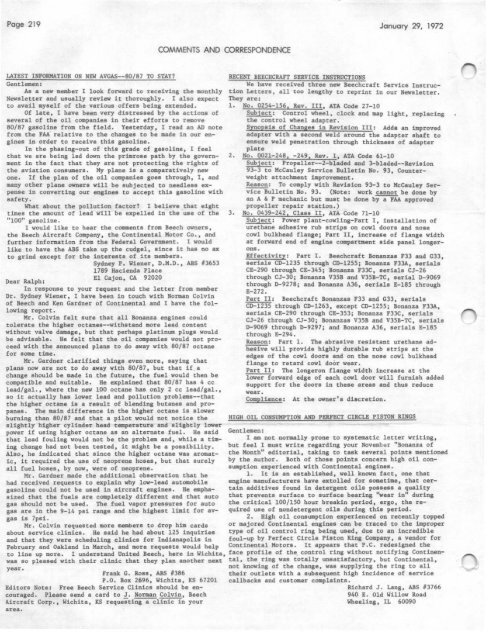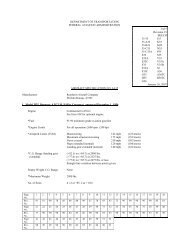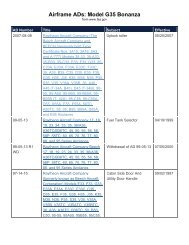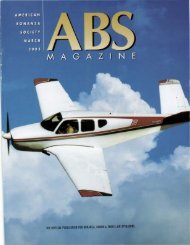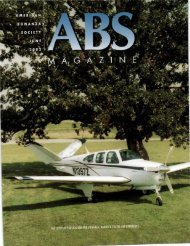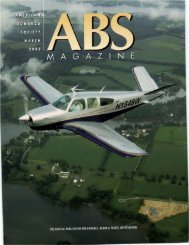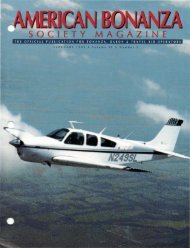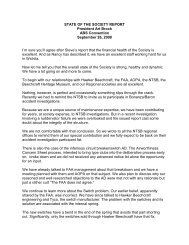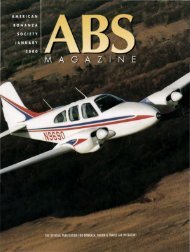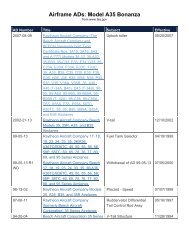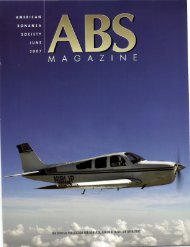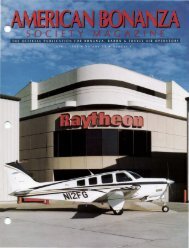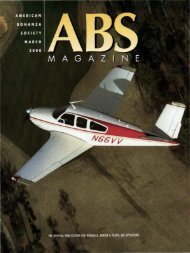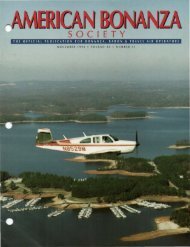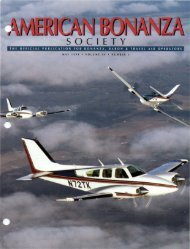AMERICAN BONANZA SOCIETY NEWSLETIER
AMERICAN BONANZA SOCIETY NEWSLETIER
AMERICAN BONANZA SOCIETY NEWSLETIER
Create successful ePaper yourself
Turn your PDF publications into a flip-book with our unique Google optimized e-Paper software.
Page 219 January 29, 1972COMMENTS AND CORRESPONDENCELATEST INFORMATION ON NEW AVGAS--80/87 TO stAY?Gentlemen:As a new member I look forward to receiving the ~onthlyNewsletter snd usually review it thoroughly. I also expectto avail myself of the various offers being extended.Of late, I have been very distressed by the actions ofseveral of the oil companies in their efforts to remove80/87 gasoline from the field. Yesterday. I read an AD notefrom the FAA' relative to the changes to be made in our enginesin order to receive this gasoline.In the phasing-out of this grade of gasoline, I feelthat we are being led dawn the primrose path by the governmentin the fact that they are not protecting the rights ofthe aviation consumers. My plane is a comparatively newone. If the plan of the oil companies goes through, I, andmany other plane owners will be subjected to needless expensein converting our engines to accept this gasoline withsafety.What about thetimes the amount of"100" gasoline.pollution factor? I believe that eightlead will be expelled in the uae of theI would like to hear the comments from Beechthe Beech Aircraft Company, the Continental Motorfurther information from the Federal Government.like to have the ABS take up the cudgel, since itto grind except for the interests of its members.Sydney P. Wiener, D.M.D.,1789 Hacienda PlaceEl Cajon, CA 92020owners,Co., andI wouldhas no axABS #3653Dear Ralph:In response to your request and the letter from memberDr. Sydney Wiener, I have been in touch with Norman Colvinof Beech and Ken Gardner of Continental and I have the followingreport.Mr. Colvin felt sure that all Bonanza engines couldtolerate the higher octanes--withstand more lead contentwithout valve damage, but that perhaps platinum plugs wouldbe advisable. He felt that the oil companies would not proceedwith the announced plans to do away with 80/87 octanefor some time.Mr. Gardner clarified things even more, saying thatplans now are not to do away with 80/87, but that if, achange should be made in the future, the fuel would then becompatible and suitable. He explained that 80/87 has 4 cclead/gal., where the new 100 octane has only 2 cc lead/gal.,so it actually has lower lead and pollution problems--thatthe higher octane is a result of blending butanes and propanes.The main difference in the higher octane is slowerburning than 80/87 and that a pilot would not notice theSlightly higher cylinder head temperature and slightly lowerpower if using higher octane as an alternate fuel. He saidthat lead fouling would not be the problem and, while a timingchange had not been tested, it might be a possibility.Also, he indicated that since the higher octane was aromatic,it required the use of neoprene hoses, but that surelyall fuel hoses, by now, were of neoprene.Mr. Gardner made the additional observation tbat hehad received requests to explain why low-lead automobilegasoline could not be used in aircraft engines. He emphasizedthat the fuels are completely different and tbat autogas should not be used. The fuel vapor pressures for autogas are in the 9-14 psi range and the highest limit for avgasis 7psi.Mr. Colvin requested more members to drop him cardsabout service clinics. He said he had about 125 inquiriesand that they were scheduling clinics for Indianapolis inFebruary and Oakland in March, and more requests would helpto line up more. I understand United Beech, here in Wichita,was so pleased with their clinic that they plan another nextyear.Frank G. Ross, ABS #386P.O. Box 2696, Wichita, KS 67201Editors Note: Free Beech Service Clinics should be encouraged.Please send a card to J. Norman Colvin, BeechAircraft Corp., Wichita, KS requesting a cl~n yourarea.RECENT BEECHCRAFT SERVICE INSTRUCTIONSWe have received three new Beechcraft Service InstructionLetters, all too lengthy to reprint in our Newsletter.They are:1. No. 0254-156. Rev. III, ATA Code 27-10Sub1ect: Control wheel. clock and map light, replacingthe control wheel adapter.Synopsis of Changes ·in Revision III: Add. an improvedadapter with a second weld around the adapter shaft toensure weld penetration through thickness of adapterplate2. No. 0021-248. -249. Rev. I, ATA Code 61-10Subject: Propeller--2-bladed and 3-bladed--Revision93-3 to McCauley Service Bulletin No. 93, Counterweightatt3chment improvement.Reason: To comply with Revision 93-3 to McCauley ServiceBulletin No. 93. (Note: work cannot be done byan A & P mechanic but must be done by a FAA approvedpropeller repair station.)3. No. 0439-242. Class II, ATA Code 71-10Subject: Power plant-cowling-Part I, installation ofurethane adhesive rub strips on cowl doors and nosecowl bulkhead flange; Part II, increase of flange widthat forward end of engine compartment side panel longerons.Effectivity: Part I. Beechcraft Bonanzas F33 and G33,serials CD-123S through CD-1255; Bonanza F33A. serialsCE-290 through CE-345; Bonanza F33C, serials CJ-26through CJ-30; Bonanza V3SB and V35B-TC. serial D-9069through D-9278; and Bonanza A36, serials E-l$5 throughE-272 .Part II: Beechcraft Bonanzas F33 and G33, serialsCD-1235 through CD-1263, except CD-1255j Bonanza F33A,serials CE-290 through CE-353; Bonanza F33C, serialsCJ-26 through CJ-30; Bonanzas V35B and V35B-TC, serialsD-9069 through 0-9297; and Bonanza A36, serials E-18Sthrough E-294.Reason: Part 1. The abrasive resistant urethane adhesivewill provide highly durable rub strips at theedges of the cowl doors and on the nose cowl bulkheadflange to retard cowl door wear.Part II: The longeron flange width increase at thelower forward edge of each cowl door will furnish addedsupport for the doors in these areas and thus reducewear.Compliance:At the owner's discretion.HIGH OIL CONSUMPTION AND PERFECT CIRCLE PISTON RINGSGentlemen:I am not normally prone to systematic letter writing,but feel I must write regarding your November "Bonanza ofthe Month" editorial, taking to task several points mentionedby the author. Both of those points concern high oil consumptionexperienced with Continental engines.1. It is an established, well known fact, one thatengine manufacturers have extolled for sometime, that certainadditives found in detergent oils possess a qualitythat prevents surface to surface bearing ''wear in" duringthe critical 100/150 hour breakin period, ergo, the requireduse of nondetergent oils during this period.2. High oil consumption experienced on re~ently toppedor majored Continental engines can be traced to the impropertype of oil control ring being used, due to an incrediblefoul-up by Perfect Circle Piston Ring Company, a vendor forContinental Hotors. It appears that P.C. redesigned theface profile of the control ring without notifying Continental.the ring was totally unsatisfactory, but Continental,not knowing of the change, was supplying the ring to alltheir outlets with a subsequent high incidence of servicecallbacks and customer complaints.Richard J. Lang, ABS #3766940 E. Old Willow RoadWheeling, IL 60090


